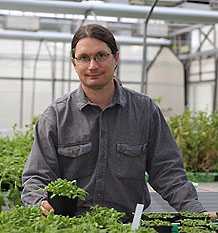Professor Seth J Davis
Chair of Plant Biology
Research
Our group uses molecular genetics in plants and algae to answer questions of physiology, metabolism and development. Broadly this is within two themes: angiosperm circadian-clock function and environmental responses in an extremophilic microalga.
Using Arabidopsis and barley, we have worked to unravel the mechanistic interconnections of environmental sensing under diurnal conditions with immediate use in crop improvement. Here our interests are focussed on circadian-clock mechanism, daily inputs to the clock and the quantitative analysis of clock outputs. In this there is use of systems modelling, metabolite profiling, cell biology, quantitative genetics and molecular genetics. All of this is to provide a closed-loop mechanism of the clock. In connecting quantitative discoveries to crop improvement we have contributed to describing the genetics of the barley oscillator and collaborated to show how allelic variation in clock genes are associated to developmental and metabolic traits associated to yield, particularly in clock variants grown in unfavourable conditions.
Using Galdieria we have explored how a microalga can survive extreme conditions. These species are red algae that display enormous capacity to thrive at highly acidic conditions (down to pH 0) and temperatures above 55 ˚C, the theoretical limit of eukaryotic life. Galdieria are metabolic workhorses that grow vigorously on virtually any carbon source and can also process raw and toxic metals. We therefore are studying the metabolic capacity of Galdieria under differing growth conditions to understand their unique biology and use this to assess the economic potential for these organisms in Industrial Biotechnology. To identify physiological responses underlying their metabolic capacity, high quality reference genomes are being generated. Our goal is to standardise telomere-to-telomere approaches to genomics to explore suites of evolutionary questions that arise around a eukaryotic extremophile genome.
Teaching and scholarship
![]()
As a plant geneticist I use skills-based teaching to focus on improving communication relevant to career ambitions. I use my teaching time to help students engage with how their educational career can foster their life-long ambitions.
![]()
I teach second-year's skills were research-led teaching is explored. Groups of students devise a project and take it to its conclusion. Oral and visual communication of results is then an engaged-educational activity to explore the communication of the scientific process. I also teach within the forth-year Critical analysis course where advanced students are directed to consider how the literature can guide their own research process, and continue that with a grant-writing exercise to formulate how written communication is used in accessing resources relative to future career interests.
![]()
In my first-year tutorials we focus on Genetic Modification. Going through the concepts of transformation of bacteria, plants and animals, students then engage with literature at differing scales to explore natural-science explanations of the merits and disadvantages of this technology. In second-year tutorials, we explore the genetics of the model-plant Arabidopsis. Emphasis on "why models" leads to historical views of how genetics leads to developmental, physiological and genomic understandings of given biological processes.
![]()
Four project concepts have been offered to final year students: circadian research in Arabidopsis, Galdieria biochemistry, genomics – assembly and annotation, and finally, data-analysis of "larks and owls" of human cohorts.


